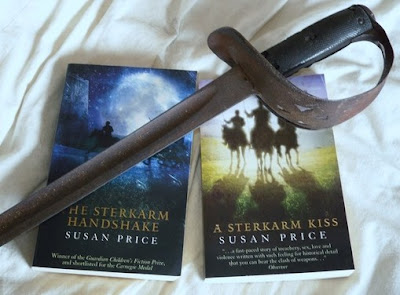I've been working on the third book in the Sterkarm series, after The Sterkarm Handshake and A Sterkarm Kiss. In fact, I've been working on it for the past three years, amongst other things.
Most of that work has been done on my laptop, in the corner of my sofa - partly because that suited me and partly because what I call 'my office' upstairs was in such a mess I could hardly get in the door.
Housework has never been a priority for me - and then when both my parents were ill a few years ago, a lot of other things fell by the wayside. And since they died, a lot of things haven't seemed worth bothering about. The 'office' became a place to stuff oddments into and close the door.
But the work on Sterkarm 3 is becoming increasingly serious. I felt the need of somewhere I could go that was away from my usual sofa-corner, a new place that would send my brain the signal, 'Time to work.'
Like many other writers, I've often found it productive to get out of the house altogether, and go and work in a library, pub or cafe. I spent a lot of time trying to think of somewhere. The library was out, because personally, I find the grim silence in libraries distracting! I prefer somewhere with a bit of talk and coming and going. But the trouble with pubs and cafes is that you have to keep buying food and drink as 'rent'. This is perfectly reasonable - if I was trying to make a living from running a cafe, I wouldn't want the place full of free-loading writers either. But reasonable as it is, I still can't afford it.
So I decided to clear my office of junk, generally tidy up, and see if it could serve as my change of scene. For the past week it's been working well. And I thought I should commemorate the tidy office, because it probably won't stay that way for very long.
It may not seem remarkable to you, but those friends and relatives who have been allowed into the place over the past few years will be staggering with shock at this photo. There are places where you can put things down!
I was too ashamed to publish a 'before' shot, but just imagine the desk and chair piled with archaelogical layers of papers, cds, books... And the floor littered with the pages of books ripped apart to make e-books.
I had a lot of photos, cards and such that I wanted to display: and decided to tack them to the back wall instead of having them cluttering shelves and falling off in drifts.
That male nude in the centre is a birthday card sent to me by my Mom and Dad. Obviously, that's the only reason it's up there - for sentimental reasons. Alongside it is the crashing racing-car card sent to me by my brother when I was learning to drive: 'Mirror - signal - manouvre - Oh !&%?!!' It still makes me laugh.
Here's my own ghost-drum on its shelf, with its antler hammer, so I can summon the spirits - or Blott - when I need them.
Weather Report: Friday 18th. Here, on top of the Black Country Plateau, it has been snowing gently but persistently all day. Kerbs have vanished, steps have become slopes, and my car is one big white mound. Don't think I'll be seeing anyone this weekend. Plenty of time to work!
Most of that work has been done on my laptop, in the corner of my sofa - partly because that suited me and partly because what I call 'my office' upstairs was in such a mess I could hardly get in the door.
Housework has never been a priority for me - and then when both my parents were ill a few years ago, a lot of other things fell by the wayside. And since they died, a lot of things haven't seemed worth bothering about. The 'office' became a place to stuff oddments into and close the door.
But the work on Sterkarm 3 is becoming increasingly serious. I felt the need of somewhere I could go that was away from my usual sofa-corner, a new place that would send my brain the signal, 'Time to work.'
Like many other writers, I've often found it productive to get out of the house altogether, and go and work in a library, pub or cafe. I spent a lot of time trying to think of somewhere. The library was out, because personally, I find the grim silence in libraries distracting! I prefer somewhere with a bit of talk and coming and going. But the trouble with pubs and cafes is that you have to keep buying food and drink as 'rent'. This is perfectly reasonable - if I was trying to make a living from running a cafe, I wouldn't want the place full of free-loading writers either. But reasonable as it is, I still can't afford it.
So I decided to clear my office of junk, generally tidy up, and see if it could serve as my change of scene. For the past week it's been working well. And I thought I should commemorate the tidy office, because it probably won't stay that way for very long.
It may not seem remarkable to you, but those friends and relatives who have been allowed into the place over the past few years will be staggering with shock at this photo. There are places where you can put things down!
I was too ashamed to publish a 'before' shot, but just imagine the desk and chair piled with archaelogical layers of papers, cds, books... And the floor littered with the pages of books ripped apart to make e-books.
I had a lot of photos, cards and such that I wanted to display: and decided to tack them to the back wall instead of having them cluttering shelves and falling off in drifts.
That male nude in the centre is a birthday card sent to me by my Mom and Dad. Obviously, that's the only reason it's up there - for sentimental reasons. Alongside it is the crashing racing-car card sent to me by my brother when I was learning to drive: 'Mirror - signal - manouvre - Oh !&%?!!' It still makes me laugh.
Here's my own ghost-drum on its shelf, with its antler hammer, so I can summon the spirits - or Blott - when I need them.
Here's a corner of one bookshelf -
But now I have to get back to work, so I will hand you over to Blott...





.jpg)
.jpg)
.jpg)
.jpg)







.jpg)



.jpg)
.jpg)
.jpg)

































